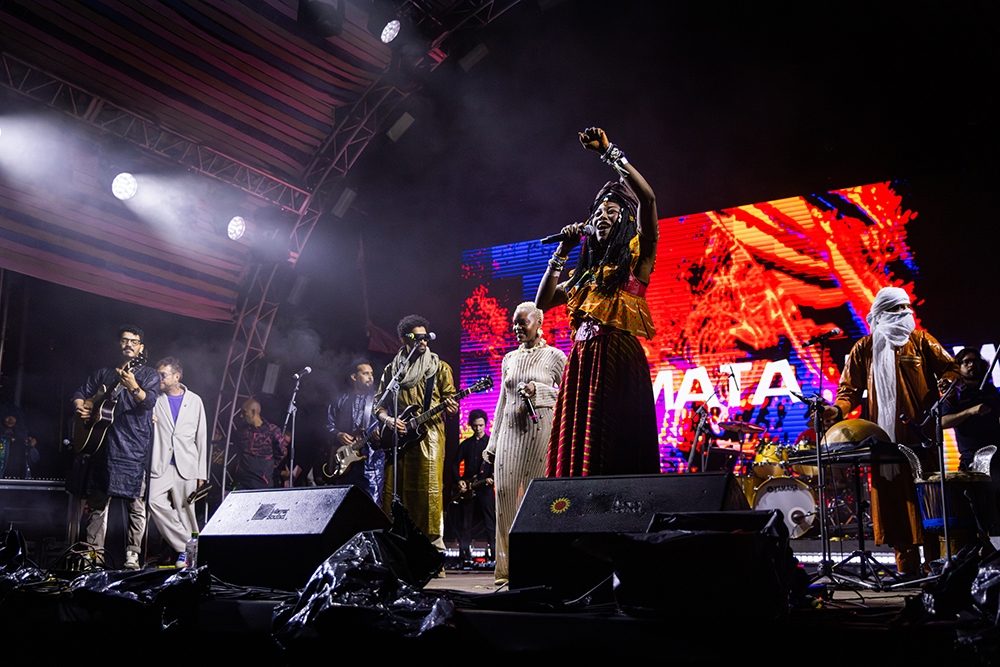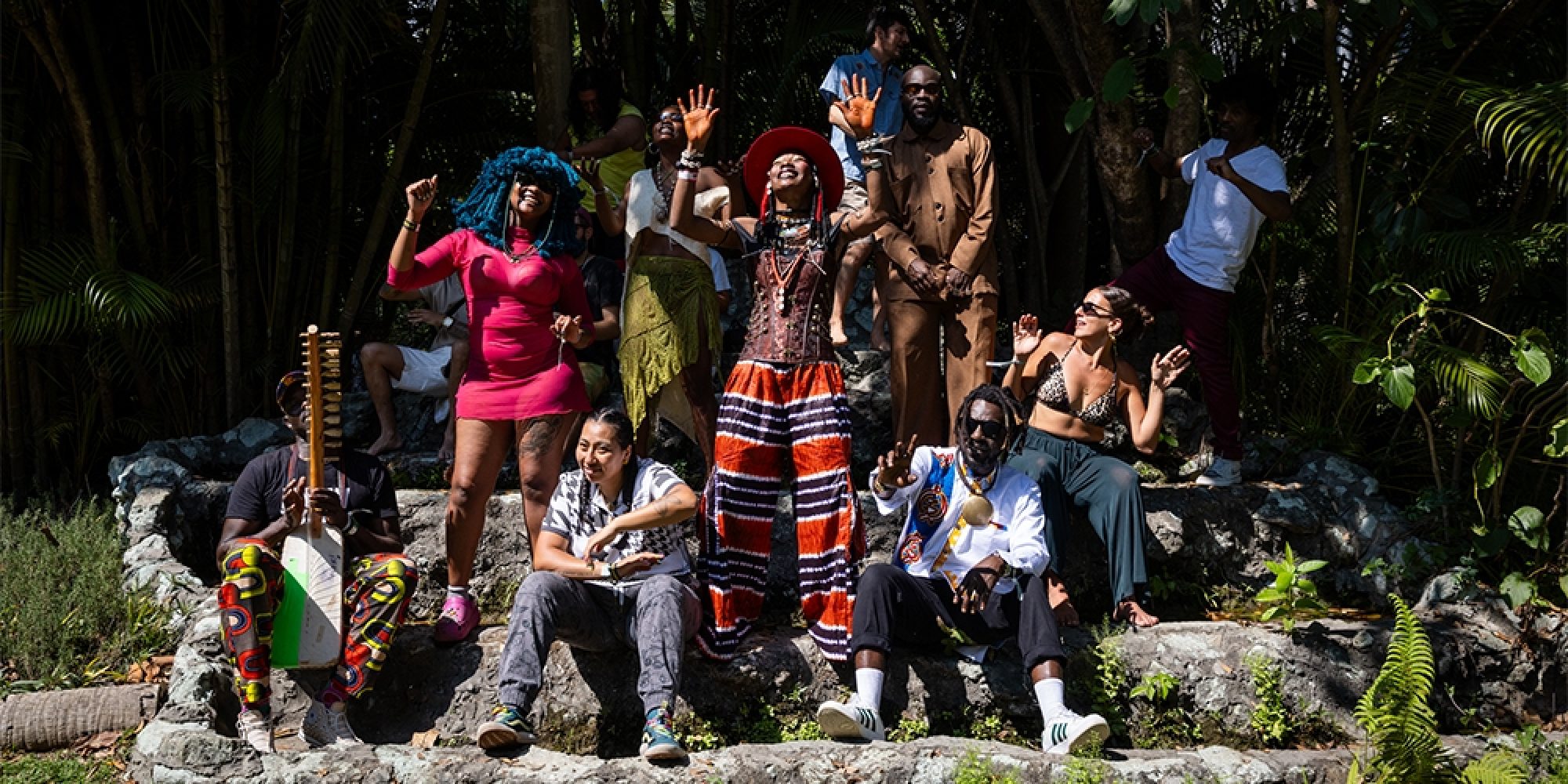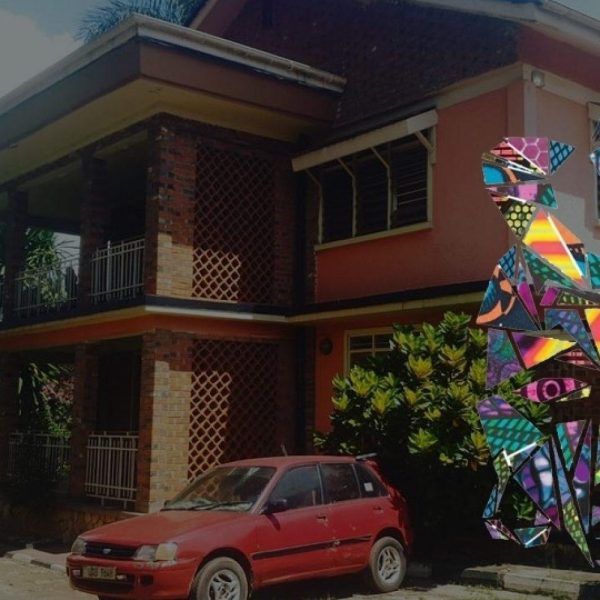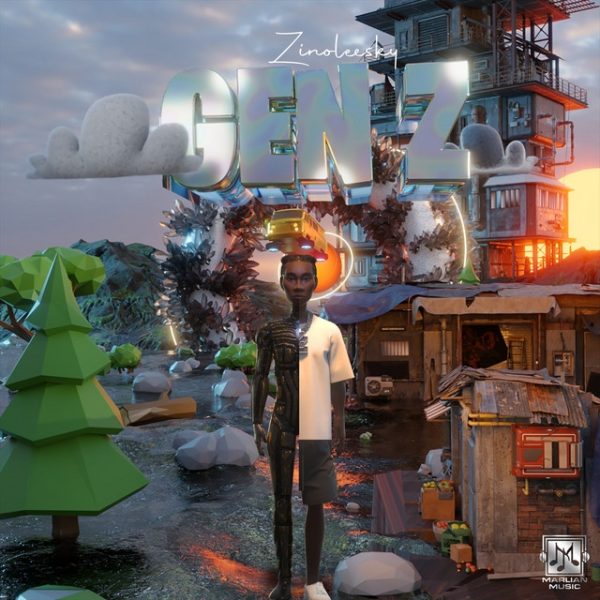Launched in Mali in 2006, Africa Express is a global collaborative community of musicians. At first, the idea was to link Malian artists like Toumani Diabaté, Bassekou Kouyaté and Amadou & Mariam with visiting artists like Martha Wainwright, Fatboy Slim and co-founder Damon Albarn. Over the years, Africa Express has grown into a robust global force, staging tours, recordings, videos and marathon concerts involving such artists as Baaba Maal, Blur, Charli XCX, Faia Younan, Femi Kuti, Flea, Franz Ferdinand, Kano, Oumou Sangaré, Paul McCartney, Paul Weller, Rachid Taha, Rokia Traoré and Tony Allen among others.
In 2024, Africa Express went to the Americas for the first time, headlining at a festival in Bahidorá, Mexico. Musicians, singers and DJs from around the world came together to rehearse, perform and write new music ahead of an epic five-hour show on the banks of the ancient springs of Bahidorá. Afterwards, they stayed on to record together in field studios, tents and hotel rooms. The result is a remarkable collection of 21 tracks, the project’s sixth album, Africa Express Presents… Bahidorá, just out this July.
Afropop has featured some of the pre-release videos in our Top Videos posts. Malian singer Fatoumata Diawara is a longtime Africa Express participant, and she was thrilled to join the Bahidoá sessions. Afropop’s Banning Eyre reached her over Zoom during a tour in France to talk about the Mexican project. Here’s their conversation.
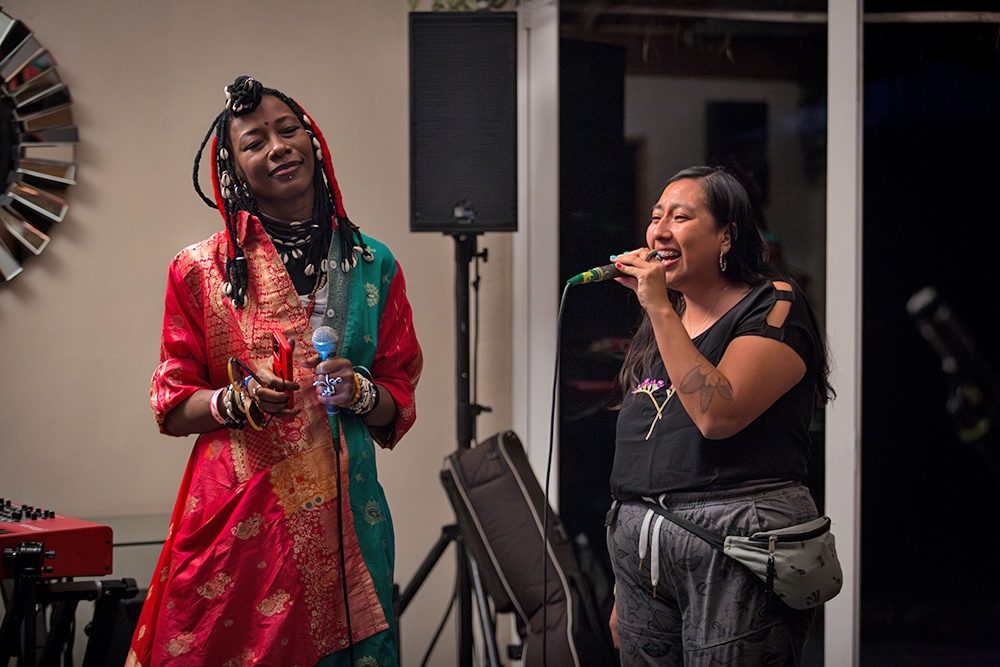
Banning Eyre: Fatoumata! So nice to see you. Where are you?
Fatoumata Diawara: I'm in Clermont Ferron, in France, where I will be going on stage in about two hours.
Fantastic. With your band? Or with Africa Express?
No, no, it's for another project. A French project called L'Âme Au Mali [the soul in Mali, also Lamomali].
Wonderful. Well, we're in New York now, where it was 103 degrees the other day. Reminds me of Bamako.
Yeah, all of the world, all around the world. We're living in hot times, aren't we?
Indeed we are. In more ways than one. So we're going to talk about Africa Express, and particularly the experience you had in Mexico. Tell me about your time there.
The tour in Mexico was amazing. The fact that you have a chance to connect with other types of music. Not being with your own band, it's a different area. You take a risk to share your music. It's three days when you really have to trust yourself, and trust the people around you. It's like a family, with our brother Damon [Albarn]. Musically, it's really rich, and the creativity is incredible because you don't go there prepared. You don't bring anything. You have nothing in your mind. You go, and you share your music with a Mexican; just go in the room and say, “Okay, sing, and he's going to answer to you.”
It's like speaking altogether, but in a new language. You’re creating a new way to speak together without speaking the same language, because I don't speak English very well, and some Mexicans also didn't speak English well. But with the music, you know, we were talking, talking with music. Boom-ba-dum-ba-dum, Boom-ba-dum-ba-dum. And you say, “Okay, let's go!”
I was so happy, because you’ve got to answer the love. It gives you hope suddenly, and positive vibrations. You realize that, finally, we are all one. We are all the same. Music is the answer to many, many beautiful and positive things.
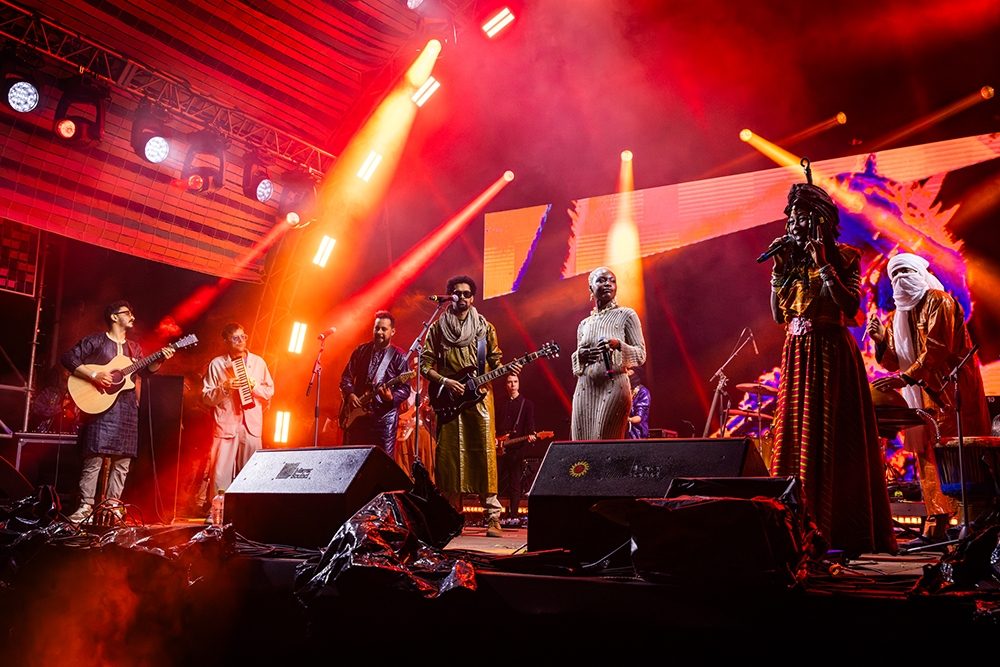
I’ve heard some of the music. I'm looking forward to hearing more. There’s a real vibe in those videos; everybody's really excited to participate. What's your history with Africa Express?
I've got a special feeling with them. We really love each other. Damon is my brother, and I promised him always to be there. Anytime he will call me for anything, I will be there. So we've been doing a lot of things together--Africa Express, the Rocket Juice & the Moon, the Bobby Womack project... We're often together. He organized two of my previous albums. So I'm there for Damon. You know, in the beginning of my career, I was nobody. Nobody. But I remember these men who respected me. Since the first time we met, Damon was one of the people who really loved me. I could sing, but not that well. You know, I was very young, I was so fresh and new in this area.
So I'm really grateful for his trust. He believed in me, and he gave me the chance to be where I am today. I also think he appreciated the fact that I was ready to face other types of music. Because many people, especially in my country, but not only in my country, when they are making this kind of music—what is called world music—sometimes you are really attached to your language. Sometimes you're very afraid to embrace other types of music because you don't want to get lost. You're like, “Oh, my God! I don't have control of this!”
You need to have courage.
It could feel in me that I was like a child, with no fear. On the contrary, I was smiling, and saying, “Let's go! I will be singing in Bambara, but you keep doing what you're doing." I don't change my personality. You don't change what you're doing, but we're going to try to create a new type of music, and that's what Africa Express is for. You challenge yourself in a deeper way so that you confirm who you are. You don't need to be somebody else. Damon will let you be who you are. And that's amazing!
The first time I saw you was at Womex, probably about 15 years ago, just when your first album was coming out. So you've known Damon from that far back?
Yeah. He’s been there since the beginning, you know. I was at the Barbican [Center in London], one month ago, and he was there. Anytime I call him, he will always be there, and that's great.
Damon has been a great friend to African music. I remember meeting him in Mali when Toumani Diabaté held his Acoustic Festival. That was 2016. It feels like a long time ago.
It does.
Let's talk about what you're up to in your own career now.
I'm doing 1,000 things. I'm finishing my new record that is almost finished. That will be released next year in the beginning of next year. In the meantime, I’ve been working with a French artist, Mathieu Chedid. We put up this Lamomali project that we’d been creating with our team before he passed away. If you go on my Instagram page, you can see all the visuals and all the videos. I'm on tour with my own project as well. So I'm trying to do everything together. You know, I don’t want to stop working, because I think the world needs a woman on stage representing all the African women and doing this type of music, because no one is singing in their native language anymore. Everybody's singing in English and French.
That's largely true, isn't it?
I'm in between the new generation and the generation before, trying to do my best.
So you're not jumping on the Afrobeats bandwagon?
No.
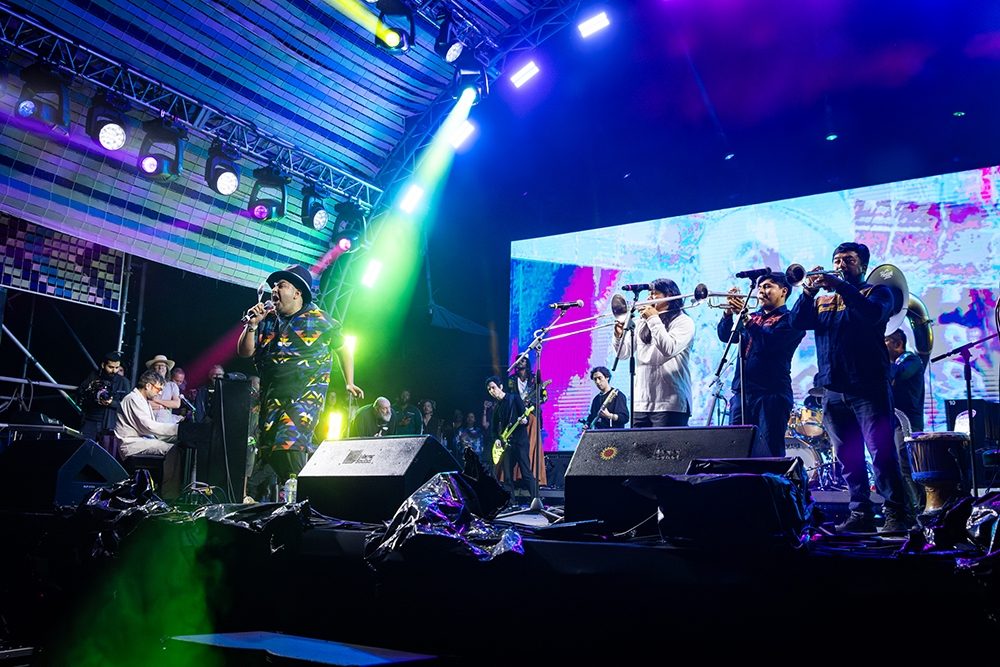
It’s funny. This is a great time for women in African music, but as you point out, a lot of them are singing Afrobeats, Nigerian pop. It’s huge, but it's a different thing from what you do.
Things have been changing a lot. Music is so different now. It's a lot of autotune and things. It’s very hard for me, because I'm in the middle of the bridge. I’m not from the generation before, or the new generation either.
Sometimes that's a good place to be.
The good thing is that people understand that I'm not using that autotune stuff, and there are still many people ready to listen to this type of music. So I'm glad; I'm really thankful.
Sure. I understand what you're saying. We've been on the air since 1988. So we've seen a lot of change, and it's hard to try to bridge that gap, to be able to speak to the young people who are discovering Afrobeats, and and also to be able to make them aware of everything that came before, the origins and the roots. It’s a confusing time, but you’ve got to rise to the challenge, right?
It is a challenge. But maybe there is going to be a change, and things will come back again. I have a kind of hope, because sometimes I miss a big band. The big bands like Toumani’s Symmetric Orchestra, or Youssou N’Dour—those big African bands.
Recently, I was speaking with Made Kuti in Nigeria, Fela’s grandson. I was saying, “Man, you have to bring that band here,” and he said. “I don't know. 15 people?” He hasn’t had to face that problem yet, having to cut musicians for a tour, but he feels like it’s coming.
I hope that this kind of music will stand. I really hope so, because the new generation, our children, must know that sound. It's so beautiful.
Well, there still seems to be a lot of great music coming out of Mali. How much time are you able to spend back there these days?
Not so much lately. I work a lot, but I can see that there are young musicians who really want to do what I'm doing, you know, playing the true music. And there is a kind of push at festivals now. They really want you to play your music, connected to the generation before, supporting them. Now everything is pop.
There are some young generation musicians who are learning traditional instruments, the kora and the ngoni. And when I go to Mali, I try to push them. I say, “Go! Hey! Don't be afraid. You don’t have to be like everybody. You can be yourself and there are still people in the world who will love you."
Absolutely. Well, good for you, Fatoumata. Mali has such rich traditions, even with all these influences and changes, I think they are here to stay, even if they go underground at times. And hopefully, as you say, they'll rise again.
We must protect them.
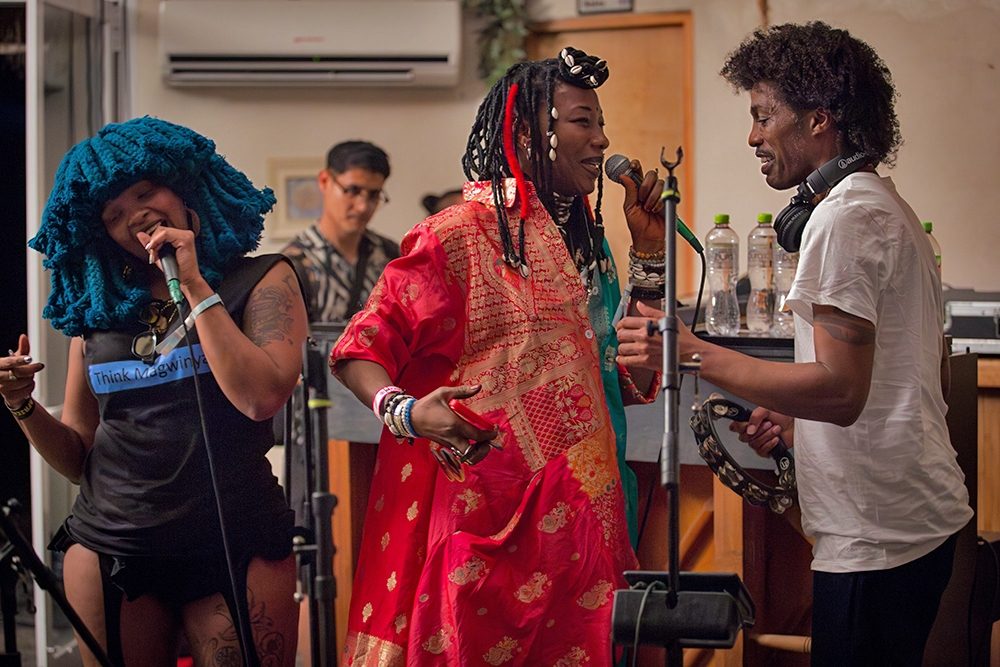
I don't know how much you want to say about this, but what do you think about what's going on in Mali politically? Are you feeling good or bad about the way things are going? It's a lot of change.
It's a lot of change, not only in Mali, but in the world. I mean, the world is going crazy. So this is not anymore about Mali. It’s about human being, how we can love each other, accepting our diversity, seeing that diversity. That’s something deeper spiritually. It's a divinity, something that we can never change. It’s God who has decided to make it like that, and we just have to accept and embrace our diversity and love each other.
I’m trying to find a solution, a way to do things with simplicity, not with barbarity. We have to be soft like water, not like fire all over the world. Children coming in the future deserve to be in a better place in this world. They need to know about love. We must teach them love; everything cannot be material. It is possible to be happy with no car, with no money, with no material things. These are artificial things; you can still have the good things in life. I'm playing for all of the world. Money can be fine. It just depends on your vision, you know?
Something I always loved about Mali is that even though it is so poor, people take great pleasure in their food, their dress, their music. There is such richness in the midst of economic poverty.
More people are very happy in Africa than anywhere else in the world. When you go there, you will face the poverty. But that poverty means nothing because happiness is not in material things. You might get all the things you want, but maybe never be happy.
It's true.
So let's be simple and pray for the best for this world.
Well, we look forward to hearing all this Bahidorá music. Do we have any hope of seeing you over here in the U.S.?
Next year we're planning to come with my new record.
We'll be watching. We'll be there to promote all of that when the time comes.
Please, please. It’s coming very soon. Yeah.
Well, thank you for taking time to talk, and have a great show tonight. It is lovely to see you again.
Me too. Thank you. Bye-bye.
